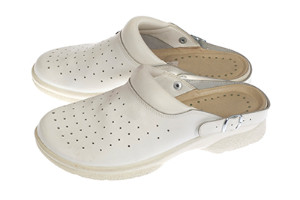
In the demanding realm of the medical profession, where long hours and dynamic tasks are the norm, prioritizing foot protection is paramount for healthcare practitioners. Nurses, doctors, and other medical personnel are constantly on their feet, navigating diverse terrains within clinical settings. The right footwear becomes not only a matter of comfort but a crucial element of occupational safety. Wearing quality, supportive shoes not only cushions the impact of prolonged standing but also guards against potential hazards such as spills or sharp objects. Additionally, healthcare workers often face the risk of exposure to various pathogens, making impermeable and easily cleanable footwear an essential line of defense. Acknowledging the importance of foot protection is a proactive step toward preventing musculoskeletal issues and ensuring the overall well-being of those dedicated to the noble pursuit of healing. If you have questions about specific types of shoes to wear while working in the medical field, it is suggested that you consult a podiatrist who can guide you toward making the right footwear choices.
While working on the feet, it is important to take the proper care of them. For more information about working on your feet, contact Brandon M. Zuklie, DPM from New Jersey. Our doctor will treat your foot and ankle needs.
Working on Your Feet
Standing on your feet for long periods of time can cause stress and pain in your feet. Your whole body may experience change in terms of posture, back pain, bunions, callouses and or plantar warts. There are ways to avoid these conditions with proper foot care, smart choices and correct posture.
Positive Changes
Negative heeled shoe – Choosing this shoe type places the heel slightly lower than the ball of the foot. These are great for overall foot health. Find shoes that fit you correctly.
Go barefoot – Our feet were not designed to be enclosed for all hours of the day. Try to periodically expose your feet to air.
Eliminate Pain
Foot Exercises – Performing simple exercises, incorporating yoga and doing stretches are beneficial. This will allow increased blood flow to the area and muscles of the foot.
Achilles tendon – Stretching the foot out flat on the floor will relax the calf muscles and tendon. These exercises can be performed almost anywhere. Make sure you add these exercises to your daily regimen.
With a little bit of this information and knowing more about foot health, you will notice changes. Foot stretches and proper footwear will help with pain and prevent further issues.
If you have any questions please feel free to contact our offices located in Piscataway, Jamesburg, and Branchburg, NJ . We offer the newest diagnostic and treatment technologies for all your foot and ankle needs.
